Yated Ne’eman – Yated Hashavua
Sept. 19, 2014
By: Y. Shalev
“YOU ARE OUR ANGELS” – A DAY OF SHARING THE BURDEN – WITH RABBI CHANANYA CHOLLAK AND THE EZER MIZION VOLUNTEERS IN THE TOUGHEST HOSPITAL WARDS
“Ko’ach Ezer” – All-Embracing Help
At the entrance to the Oncology Ward, the world stops. A fight for life rages in every room, in every bed. And as in war, there are many forces involved: doctors and nurses, relatives and friends, social workers, medical clowns, and more. Each one and his job, each one and his part in the battle * But hovering over them all is the “Iron Dome” of Ezer Mizion, there at the ready to intercept every challenge, remove every obstacle that appears on the way, and take care of all the auxiliary matters, so that the people fighting for their lives can focus on the battle, and with Hashem’s help, get past it safely.
A hum of whispers accompanies Rabbi Chananya Chollak’s entrance to the ward. Doctors and staff members alike, parents and children, all look up to him with reverent eyes. 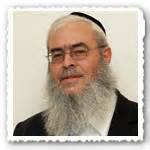 This is the man who stands behind the two-word phrase, “Ezer Mizion,” a phrase that personifies for them the light within the darkness, the warm, enveloping embrace in rocky, frightening times.
This is the man who stands behind the two-word phrase, “Ezer Mizion,” a phrase that personifies for them the light within the darkness, the warm, enveloping embrace in rocky, frightening times.
Those who recognize Rabbi Chollak quickly inform the others of the identity of the one who came in, and they too join in eying the man who stands behind all the good angels filling the ward around the clock, all in one, single goal: to help relieve the patients’ burden.
But Rabbi Chollak does not seem to register the looks of reverence. He came here to visit the sick, wish them a speedy recovery, and he does so with the full seriousness that befits someone who knows all too well what this battle is all about and who believes that relieving the patient’s burden is literally a matter of saving life.
Hashem Will Help!
He dons covers on his shoes and a surgical mask on his mouth and nose and opens the door of the isolation room. A young couple sits there next to the crib of their baby son, who underwent a bone marrow transplant from a donor found for him in the Ezer Mizion Registry. Rabbi Chollak inquires of the details and the father tells him the type of illness, the treatment that was given and the doctors’ prognosis. Medical terms, their difficult pronunciation merely hinting at the real difficulty of actually coping with them, roll easily off this young man’s tongue. His friends are probably busy with terms from the world of weddings, or at most, the world of mortgages and projects going up for young couples. How is it that he is occupied with such terrifying terms?
Tears come to the eyes uninvited, but the young mother is determined: “With Hashem’s help, he will get better and this entire period will be like a huge wave that came and went, leaving us only with strengthened faith and a more developed relationship between us. But there is no doubt that a major part of our growth and strength is credited to Ezer Mizion. Without them, we would have fallen apart.”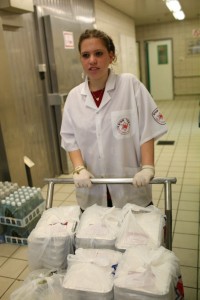
In the ward itself, Rabbi Chollak goes from bed to bed, taking a sincere interest in each and every patient, showering words of encouragement and hope, and giving a sick child a bag of treats. At the conclusion of each visit, he asks for the name of the patient and his mother, closes his eyes in intense concentration, and prays – for Sarah bat Shulamit, may she have a full recovery among all the Jewish ill, for Shlomo ben Limor, for Chaim Uri ben Dalia, and for each and every one of the children – l’refuah shleimah b’toch she’ar cholei Yisrael.
“Hashem will help!” he encourages a group of mothers who stepped out of the room so that the cleaning help could do their job. The caring in his eyes adds depth of meaning to the words so often superficially tossed out. “Yishtabach shemo la’ad – May His Name be eternally praised!” responds one mother, a somewhat unexpected expression, considering her external appearance. But she does not leave any doubts. “Yishtabach shemo la’ad! That is my motto these days. We are strong! In this place, we see the Jewish nation that is all heart! So many organizations, so much help, so much caring! And it is all for the name of G-d and His children. There is no one like the Jewish people and none like their G-d. Yishtabach shemo la’ad!” she concludes, and you can tell that this is indeed the motto that helps her in the fight with her daughter’s illness.
A suspicious glint is seen in the eye of a mother carrying her son in her hands. Rabbi Chollak inquires of the details, and soon enough, the teary glint is contagious. This little boy was already healthy, but the illness returned in full force. The doctors say there is nothing they can do … Again, he asks for the name of the child and his mother, his eyes close, and the prayer is uttered. “Hakadosh baruch Hu can do everything. Don’t lose hope!” he says quietly. “We never give up hope,” the mother promises, holding the child close to her heart.
Resolute Mission
In the next room sits an Ezer Mizion volunteer next to the bed of a seven-year-old girl. “How long will you be here with her?” I ask. “Until another volunteer comes to relieve me…” she replies, and a slight spasm of her face hints to me not to go on and ask the obvious question: “And where are the parents?” Once outside the room, Yumi will tell me that the parents, wretched and impoverished, come to “visit” their daughter from time to time, but the ones who are with her on a regular basis are the Ezer Mizion volunteers.
We pass by a cart set up with refreshments for all those who come through the ward – a compact cafeteria, offering home-made cake and drinks. The “Ezer Mizion” symbol on the cups leaves no room for doubt. Next to the cart sits a pleasant-countenanced volunteer, who pours and serves the drinks, asks “How much sugar,” and wipes away a drop of milk that dripped on the cart, making sure everything is esthetic, dignified and respectful.
A sweet little girl rides a tricycle alongside her mother. Her bald head seems incongruous with the merry mischief dancing in her eyes. “What’s your name,” Rabbi Chollak asks, bending all the way down to the colorful tricycle. “Talia,” the girl answers in a tinkling voice, happily accepting the bag of treats he offers her. “I’m going to eat it all up and nothing will be left for anyone else,” she announces with amazing self-confidence. “How old are you, Talia?” inquires Rabbi Chollak. “Three,” she replies. “And when will you be four?” he goes on, but she is already riding away, checking out the sweets in the bag, and the question remains hanging in the air. We bless Talia that she should indeed reach the age of four, hale and healthy, with the horrible disease behind her.
From every direction, people come over, shake Rabbi Chollak’s hand in choked silence, exchange looks reserved for people of one family, even if not biologically related, and their eyes express the depth of the gratitude they concentrate into one immortal word: Thanks! Or at most, three words: Thanks for everything!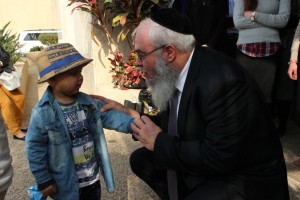
“You are our angels,” the phrase is heard again and again, and not as an empty cliché. On the surface, it seems as if everyone studied the same script, but when you hear the intonation and see the look that comes along with the words, and especially – when you hear of the cushion of warm, embracing help Ezer Mizion offers families of cancer patients, you understand the depth of meaning contained in the word “angels” appended automatically to Ezer Mizion volunteers: “Angels” are the agents of the Creator. G-d has many agents, and Ezer Mizion chose to be His agents in the Oncology Ward – counseling, guiding, supporting, and helping, in the hospital and at home, to parents and children, from the technical aspect and from the emotional-spiritual aspect. No wonder that they are seen as “angels”!
In the virtual telephone book of every person here are the personal phone numbers of these angels, representatives of Ezer Mizion in the Oncology Ward of the hospital and in the organization’s Cancer Patients’ Support Division: Yumi, Zevi, Blumi, Ophira, and all the rest. Every time there is a problem, question, difficulty, or request, they do not hesitate to call. Experience has already taught them that if they want to do Ezer Mizion a favor, all they have to do is call and ask, and above all – to accept what the help they want so much to give them.
The assistance is provided directly to the patients and their families, but also indirectly, via the ward staff. Here, a social worker comes over to Zevi and tells him about a problem she encountered with one of the children on the ward. You can tell by his expression how obvious it is to her that Zevi is the address for her problem and that is where the answers and the solution is to be found.
Another social worker approaches Ophira and informs her about a “new” family from Modi’in Ilit who arrived at the ward. She, too, knows that in spite of her professional training and rich experience, she could never give this family everything that Ezer Mizion will give it: Comprehensive support in every necessary area, with maximal understanding of the special sensitivities that flow from their being a Torah-observant family.
The cafeteria cart has not yet receded when another cart appears, led by a different volunteer, carrying trays with hot, fresh lunches cooked in the Ezer Mizion kitchens, to be given out to the people sitting beside the patients. It seems that nobody other than me is surprised by the sight. It happens here every day, and, as we know, routine dulls the sense of amazement.
Around the Clock, Day In Day Out
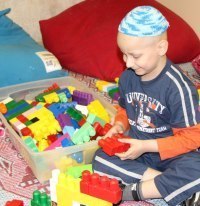 Rivky T. hosts me in the isolation room where she is sitting with her three-year-old Down’s Syndrome daughter, who has leukemia. Rivky’s eyes are gleaming and she shares her experience with me openly. “My children love Tehilla dearly, and dealing with her illness is not easy for any of us. Ever since she was born, we learned that every therapy and every entitlement, every allotment and every co-payment, even for a few dozen shekels, involves filling out countless forms, sending faxes, getting confirmations, and recommendations, and proofs… And suddenly, here we were exposed to something new: Someone who wants to give to us. Perhaps ‘wants’ is not the right word, but rather: aspires and pleads and hopes that we will agree to accept… and all this without our having to fill out a single form! Without investigating us and asking ‘Who are you, where are you from, how much do you earn, have you realized your employment potential, what newspaper do you read at home… without any bureaucracy and nitpicking, just with an amazing understanding of the needs of a family struggling with their child’s illness.
Rivky T. hosts me in the isolation room where she is sitting with her three-year-old Down’s Syndrome daughter, who has leukemia. Rivky’s eyes are gleaming and she shares her experience with me openly. “My children love Tehilla dearly, and dealing with her illness is not easy for any of us. Ever since she was born, we learned that every therapy and every entitlement, every allotment and every co-payment, even for a few dozen shekels, involves filling out countless forms, sending faxes, getting confirmations, and recommendations, and proofs… And suddenly, here we were exposed to something new: Someone who wants to give to us. Perhaps ‘wants’ is not the right word, but rather: aspires and pleads and hopes that we will agree to accept… and all this without our having to fill out a single form! Without investigating us and asking ‘Who are you, where are you from, how much do you earn, have you realized your employment potential, what newspaper do you read at home… without any bureaucracy and nitpicking, just with an amazing understanding of the needs of a family struggling with their child’s illness.
“Ever since we are here, I feel as if I am getting one long hug from Ezer Mizion, which infuses me with the strength I need to get through this tough period and backs me up with full support on the home front so that the house will continue functioning as if everything was fine. We receive a lot of technical support, and the children get therapies meant to calm them, mentors who are ready to give them the moon, and more and more.
Nechama C. sits outside the treatment room. In the carriage at her side is her baby, brother of the five-year-old sick girl. “I have been here on and off for three years already,” she relates in the tone of someone who has already made peace with the tough facts of life. “I think that everyone knows at least a part of what Ezer Mizion does for the patients and their families. For us, it came to particular expression in the time after I had the baby. They enveloped us all in everything you can imagine – and also what you can’t.
Yocheved sits alongside her two-year-old son’s bed and says Tehillim (Psalms). “You’re asking about Ezer Mizion?” She asks in wonder. “They are our family. They are our angels. For the last eight months, they have been our address for everything you can think of. Thanks to them, my head is clear of everything that would preoccupy a Jewish mother. They know that a sick child needs parents who are available – physically and emotionally, and everything they do and offer us is geared towards this objective. It is inadequate to try and list the things they do for us, because the whole is far more than the sum of its parts. The biggest help does not boil down to a listing of the specific areas of assistance that they offer at no cost, but to the fact that they are available and accessible and understand the needs of patients and their families even better than we ourselves know and understand.
“Let me tell you about the special clock we prepared for them – it is hanging in the ward – so you can understand a tiny bit of what I am talking about: On the clock face we wrote: ‘Ezer Mizion around the clock.’ Next to each of the digits on the clock, we wrote something connected to that number and connected to what Ezer Mizion does for us. For example, next to the number one, we wrote: ‘Number one in chessed’ Number three says, ‘Three nights at the summer retreat a vacation that puts us back on our feet with attractions for parents, for each girl and boy and all in abundance, with nachat and joy’; By the number five we wrote: ‘Every Thursday, a devoted volunteer cleans the house for free, in good cheer. And behind the door sits a box full of treats to make our Shabbat table complete. Number nine speaks of a unique type of chessed: On the fast day of the Ninth of Av. It’s the weary parents they are thinking of. So they take the little ones off the scene for a program of balloons and a trampoline… I’m sure that even if there were a hundred hours on the clock, we would have been able to fill each hour with another detail and another piece of the tapestry of tremendous help they do for us.” 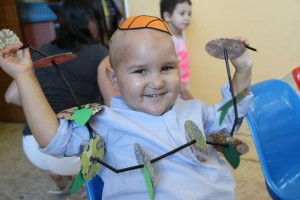
In the middle of our conversation, Yocheved’s cell phone rings. “You have a ride coming home,” the indefatigable Transport Division secretary tells her.
“I didn’t even request it!” Yocheved says with amazement. “I just told them that I need a volunteer to relieve me for two hours in the afternoon to sit with the child. But they understood on their own that if I need a volunteer – I also need a ride home. There you are – that, in short, is the whole story of this remarkable organization and the people in it: They infer what you need, they are one step ahead and figure out what we are lacking before we ourselves know.
“We can never thank them enough for all they do. All we can do is try to link on to their tremendous acts of chessed – by donating money and joining the ranks of volunteers the moment this story will be behind us.
Mothers’ Seismographs
“The Kupat Cholim refuses to reimburse me for the cost of the ambulance we took when we rushed the child to the hospital because he got a fever,” A man grabs hold of Zev Freund in the hospital corridor, shoving a pile of forms in his hand. Zev takes them, as if it was self-understood. Who, if not he, will take care of the bureaucratic glitch that is disturbing the father and not enabling him to be fully available to his sick son?
One of the doctors comes over to Yumi and exchanges a few whispered words with him. Yumi nods and the doctor continues on his way calmly, his face showing that he is assured that the matter will be taken care of.
“What is your motto?” I ask these unflagging people, who spend more time in the Oncology Ward than anywhere else.
“Life here has taught us that the child is his parents’ seismograph,” Zev explains. “The sick child needs a hundred percent Ima, but his Ima has another few children and endless obligations. We are here to remove all those concerns from her shoulders. There are general concerns, like meals and housecleaning, that everyone needs, and there are the unique concerns of each family and every day. We take both kinds of needs on our shoulders so that the parents will be totally available to their sick child. When the child tells me with pure simplicity: “Today Ima is happy,” I know that baruch Hashem, we achieved our goal.”
What the Cards Revealed
“During summer vacation, I prepared a card game for my children, and I urge everyone to adopt the idea,” Rivky T. says. “On each of the cards, I wrote a different fact, and I placed the cards in a pile. The facts were, for example: Leukemia is a scary disease; I am embarrassed by Tehilla’s baldness; It pays to have leukemia; The food we get for Shabbat is delicious; I prefer the food that Mommy cooks; I want Tehilla to come home; and so on. Every child, and also we, the parents, took a turn picking up a card and reading what it said. If he felt that the sentence on the card was correct for him, he explained why and took it for himself. If not, he put the card in another pile.
“I was very touched to see that the cards the children identified with indicated that they were not experiencing difficult, black days, but rather saw many positive things that they had. I could have even been insulted by what the cards revealed – that the food I prepare cannot always compete with the food we get from Ezer Mizion, and the attractions I can offer my children do not even come close to what their mentors do for them. The same is true for the day camps and fun days that Ezer Mizion organizes for them. But don’t worry, I’m not offended. On the contrary – I am happy that this is what the cards revealed. I know that the fact that this period will be engraved in the memories of my children as an interesting, colorful time, though certainly challenging, is all to the credit of Ezer Mizion, which enveloped us in such an amazing all-embracing support system, and thanks to their vast experience, managed to preempt the difficulties by offering us every necessary assistance, even before we realized that we need it.
